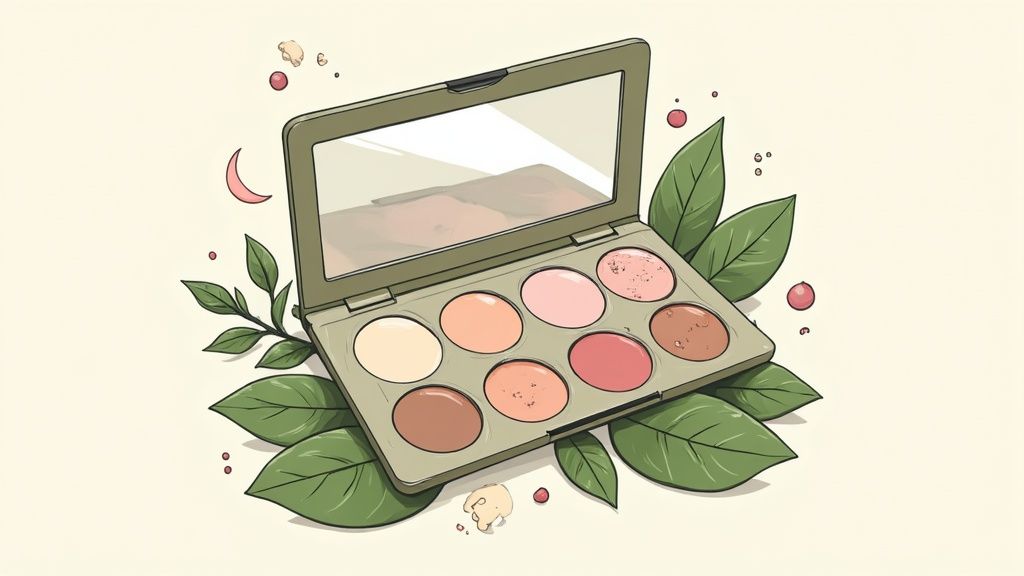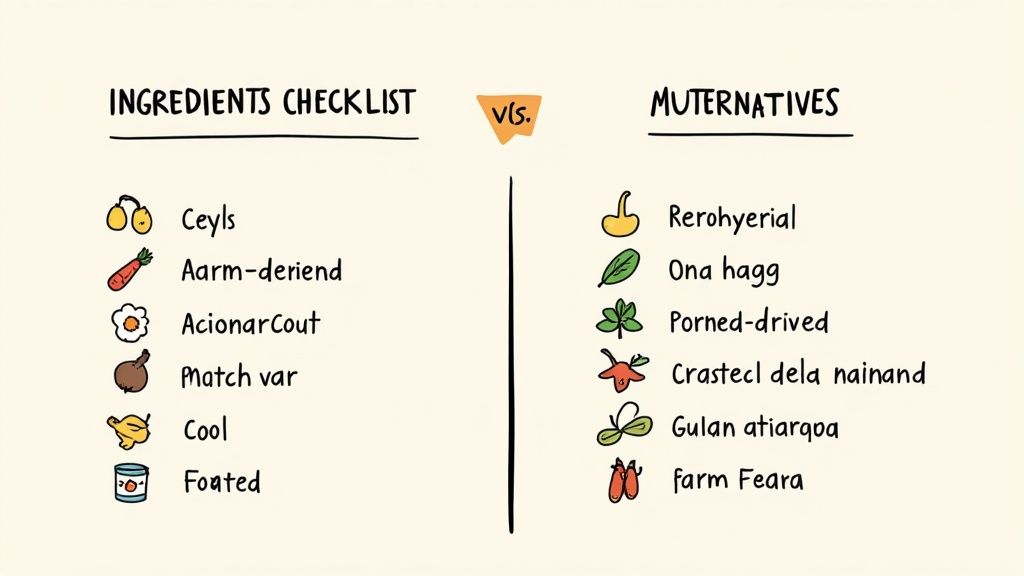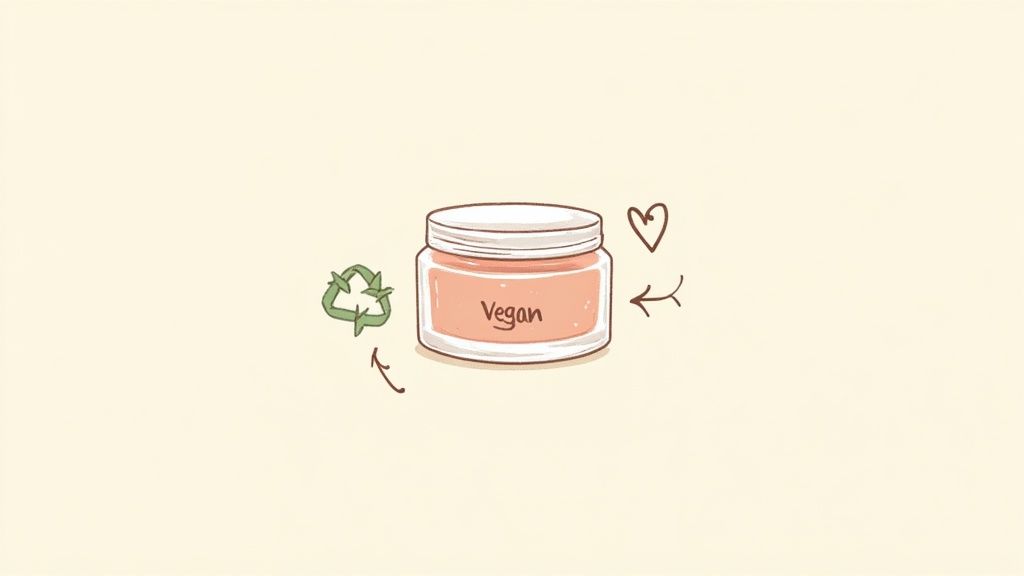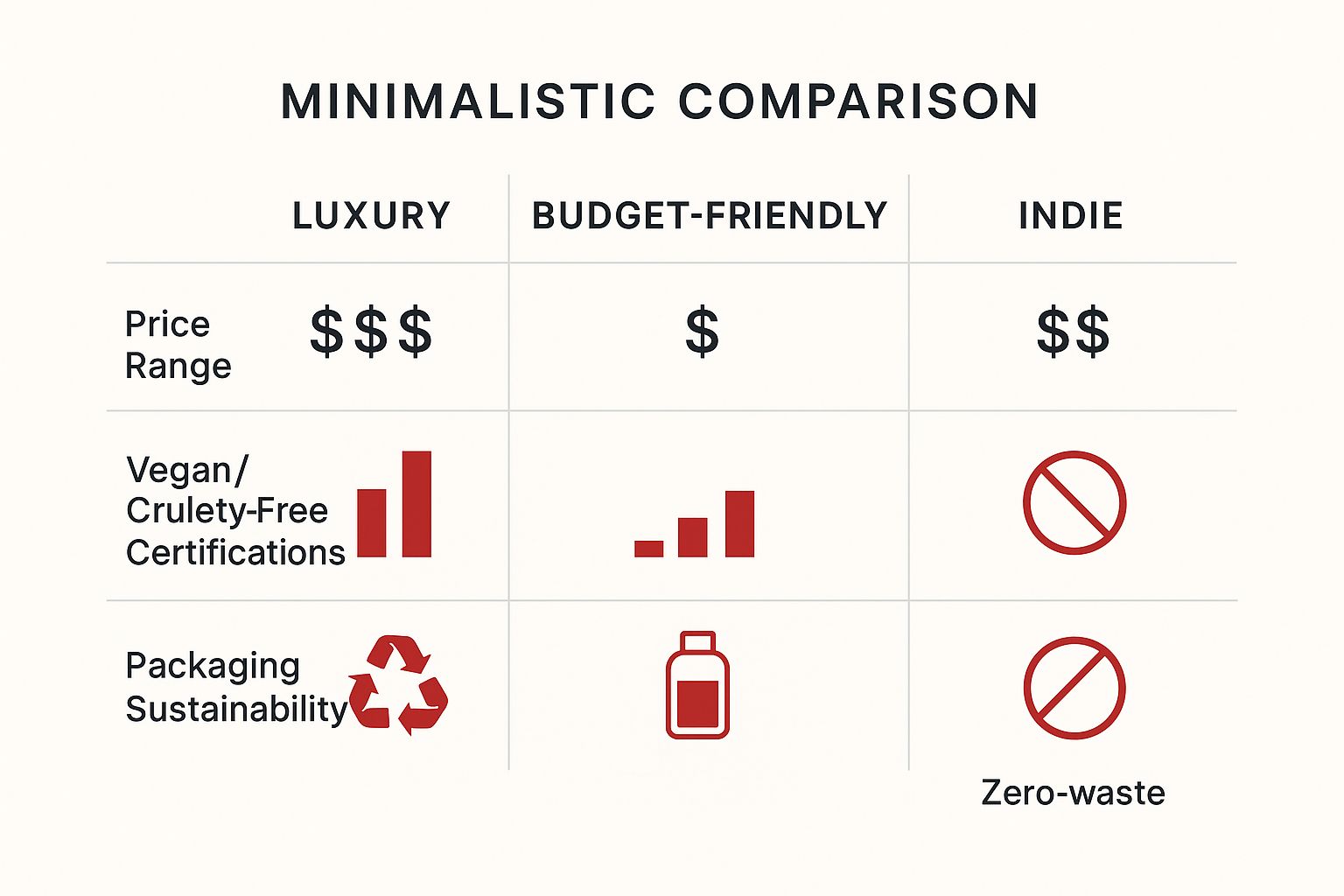When you start looking for great vegan makeup, you’ll probably see names like Axiology, Milk Makeup, and e.l.f. Cosmetics pop up again and again. These guys are mainstays for a reason. They aren’t just slapping a “vegan” label on their products; they’re known for delivering on performance, sourcing ethically, and coming up with genuinely cool formulas.
What Makes a Vegan Makeup Brand Truly Great

But let’s be real, navigating the world of vegan beauty is about more than just dodging animal ingredients. The brands that are truly killing it are the ones that weave ethical and sustainable practices into their DNA. It’s a shift powered by people like us—conscious consumers who want transparency and quality, not one or the other.
This isn’t just some niche trend, either. It’s a full-blown market force. The global vegan cosmetics market hit around $18.36 billion in 2024 and is expected to rocket to $35.50 billion by 2033. That explosive growth is coming from younger shoppers who put their money where their values are, prioritizing products that are kind to the planet and its creatures.
Beyond the Label
A truly great vegan brand has a story that clicks with your values. It’s not just about what’s in the tube, but how those ingredients got there, who made the product, and what happens to the packaging when you’re done. That deeper connection is what separates the good from the great. Digging into the principles of brand identity can show you just how deep this stuff goes.
This means you should be on the lookout for brands that are serious about:
- Ethical Sourcing: Making sure ingredients like mica and palm oil are sourced without exploiting people or wrecking ecosystems.
- Sustainable Packaging: Choosing materials that are recyclable, refillable, or biodegradable. Axiology’s paper-based packaging is a perfect example of this in action.
- Community Engagement: Actually getting involved and supporting social or environmental causes that align with their mission.
The best brands don’t just sell products; they champion a movement. They prove you don’t have to compromise on performance or luxury to make a positive impact.
Performance and Innovation
At the end of the day, the makeup has to work. The best brands know this and invest a ton into creating high-performance formulas that can go toe-to-toe with any non-vegan competitor. They’re using potent, plant-based ingredients to create vibrant pigments, long-lasting wear, and formulas that are actually good for your skin.
If you want to get into the nitty-gritty, our guide on what is vegan makeup breaks down the ingredients that make all the difference.
This dedication to quality means choosing vegan isn't a sacrifice—it's an upgrade. From creamy, hydrating lipsticks to foundations that actually improve your skin, these brands are setting a whole new standard. They’re showing everyone that ethical choices and amazing results can (and should) go hand in hand.
To make things easier, here's a quick cheat sheet for when you're checking out a new brand.
Quick Guide to Identifying Top-Tier Vegan Brands
| Evaluation Criteria | What to Look For | Why It Matters |
|---|---|---|
| Ingredient Transparency | Full ingredient lists, clear explanations of sourcing (e.g., mica, palm oil). | Proves the brand has nothing to hide and is committed to ethical practices. |
| Certifications | Leaping Bunny (cruelty-free), PETA's Beauty Without Bunnies, Certified Vegan. | Third-party verification adds a layer of trust and accountability. |
| Packaging Materials | Recycled, recyclable, biodegradable, refillable, or zero-waste options. | Shows a commitment to reducing environmental impact beyond the formula. |
| Brand Mission & Values | A clear "why" behind their brand that goes beyond selling products. | A strong mission often translates to better products and practices. |
| Product Performance | Honest reviews, high-quality pigments, good wear-time, and skin-friendly formulas. | The product must deliver on its promises to be worth your money. |
Think of this table as your go-to checklist. If a brand ticks these boxes, you're likely looking at a winner that truly aligns with a conscious, kind, and high-quality beauty routine.
Making Sense of Labels and Certifications
Walking down the beauty aisle can feel like a pop quiz, especially with words like "vegan" and "cruelty-free" being tossed around. They sound like they mean the same thing, but they're actually two very different promises. Nailing this distinction is your first big step toward choosing the best vegan makeup brands with total confidence.
A product that’s vegan has zero animal-derived ingredients. That means no beeswax in your lip balm, no carmine (made from crushed beetles) for that red pigment, and no lanolin (from sheep's wool) in your moisturizer. It’s all about what's in the formula.
Cruelty-free, on the other hand, means the product and its ingredients weren't tested on animals at any point. A product can be cruelty-free but still contain beeswax, which means it isn't vegan. And yep, it can go the other way, too—a product could be 100% plant-based but tested on animals, making it vegan but not cruelty-free.
How to Spot the Real Deal
To cut through the marketing fluff, you need to look for official third-party certifications. These logos are your guarantee that a brand has actually been audited and meets super strict standards. Be wary of unverified claims or cute, self-made bunny logos—that’s often a sign of "greenwashing," where brands try to look more ethical than they really are.
Here are the gold-standard logos to keep an eye out for:
- Leaping Bunny: This is the most rigorous global certification for cruelty-free cosmetics. It means the brand had to prove that no new animal testing was used in any phase of product development—not by them, their labs, or their suppliers.
- PETA's Beauty Without Bunnies: This program certifies brands as either "animal test-free" or "animal test-free and vegan." It's a super reliable indicator, and you can even search their online database to check on a brand.
- The Vegan Society Sunflower: See this sunflower? It guarantees the product is 100% free from animal ingredients. It’s the international gold standard for vegan products, plain and simple.
Think of it this way: a real, recognizable logo is a brand showing you their receipts. It’s proof they’ve done the hard work to back up their claims, moving past marketing buzzwords to genuine accountability.
Why This Stuff Actually Matters
Picture this: you're shopping for a new lipstick. Two options both claim to be "kind to animals." One has the official Leaping Bunny logo on the box. The other just has a generic bunny icon that the brand’s design team probably whipped up.
Without that Leaping Bunny certification, you have no real way of knowing if the second brand’s suppliers are testing on animals or if they sell in countries where animal testing is legally required. The certified logo takes all that guesswork out of the equation.
This is what separates the truly committed brands from those just hopping on a trend. Companies like Axiology go through the trouble of getting these certifications because their entire mission is built on being transparent and ethical, from start to finish. It’s an investment that proves their dedication to animal welfare and lets you shop with complete peace of mind.
Evaluating Ingredient Lists Like an Expert

Sure, certifications are your best friend for a quick check, but the real story is always hiding in plain sight on the ingredient list—that tiny text often called the INCI list. Learning how to give it a quick scan is the ultimate power move.
It’s how you go from just trusting a logo to really knowing what’s going on your skin.
The good news? You don’t need a chemistry degree to get good at this. Your goal is simply to spot the usual suspects: common animal-derived ingredients that have a knack for sneaking into makeup. For years, brands have relied on them for texture, color, and moisture, but brilliant plant-based alternatives are now everywhere.
Common Non-Vegan Culprits and Their Alternatives
Just knowing a few key ingredients will make you a pro at this. Here are the most frequent offenders you’ll find and the vegan swaps conscious brands are using instead:
- Carmine (or Cochineal): This is a red pigment made from crushed cochineal beetles. Gross, right? Brands now get stunning reds from fruit pigments, beet juice, and iron oxides without harming any insects.
- Beeswax (Cera Alba): A go-to emulsifier in lipsticks and balms. Waxes from plants like candelilla and carnauba give that same creamy, structured feel.
- Lanolin: A grease that comes from sheep's wool, commonly used in moisturizing products. Shea butter and coconut oil do the job better and are completely plant-based.
- Guanine: This is what creates shimmer in things like highlighters and eyeshadows. The not-so-glamorous source? Crushed fish scales. Thankfully, ethical brands use mica for that gorgeous, cruelty-free glow.
Once you know these, you can spot the red flags in seconds. It’s a huge shortcut to separating the truly vegan products from the ones that just talk a good game.
And this isn't just about ethics; it's a massive market shift. The global vegan cosmetics market shot up from $16.6 billion in 2021 to $19.2 billion in 2024. It’s on track to blow past $28.5 billion by 2031. That kind of growth is all thanks to people like us demanding high-performance products that don't compromise. You can read more about what's driving this trend over at Plant Based News.
A Real-World Lipstick Comparison
Let's put this into practice. Grab a conventional lipstick and you’ll likely see lanolin for moisture, carmine for that classic red, and beeswax for structure. All effective, sure, but all from animals.
Now, look at an Axiology lipstick. The ingredient list tells a totally different story. You’ll find things like avocado oil, candelilla wax, and grape seed oil—ingredients chosen not just because they're vegan, but because they’re actually good for your skin. The rich color comes from minerals, not bugs. You can learn more about the ingredients you won’t find in Axiology lipstick and see the difference for yourself.
By doing this quick side-by-side, the choice is suddenly crystal clear. One product is built on old-school, animal-based fillers, while the other is made with clean, purposeful, plant-based ingredients. That simple label check is all it takes.
Looking Beyond Ingredients to Brand Ethics

A truly great vegan makeup brand is about so much more than clean formulas. Its commitment to conscious practices should be woven into every part of the business, from how it sources ingredients to how it ships out the final product.
To find the best of the best, you have to look at the bigger picture of corporate responsibility.
This deeper level of scrutiny is becoming the new standard. It's a huge reason why the global vegan cosmetics market is projected to hit an incredible $109.75 billion by 2032. Shoppers are actively seeking out brands that reflect their personal values, pushing companies to be better across the board.
Evaluating Environmental Impact
First thing I always check? The packaging. Is it designed to minimize waste, or is it just more single-use plastic destined for a landfill? The most dedicated brands are getting seriously innovative here.
Look for these green flags:
- Recyclable Materials: Is the packaging made from glass, aluminum, or post-consumer recycled (PCR) plastic?
- Refillable Options: Does the brand offer refills for products like foundation or powders? This is a game-changer for reducing waste over time.
- Zero-Waste Design: This is where companies like Axiology really shine. By using materials like paper that can be recycled or composted, they've managed to completely eliminate plastic from their packaging.
This isn't just about pretty packaging; it’s about a brand taking real, tangible steps to reduce its footprint on the planet.
Assessing Corporate Conscience
Beyond packaging, a brand's core values reveal its true character. When you’re digging deeper than ingredients, understanding a brand's promise can show you what they're genuinely dedicated to. This means looking into how they treat people and contribute to their community.
You can usually find this info in the "About Us" or "Our Mission" section of their website. Ask yourself if the brand is actually transparent about its practices.
A brand's ethics are reflected in its actions, not just its marketing slogans. Look for evidence of ethical labor practices, fair trade sourcing for ingredients like mica, and meaningful partnerships with charitable organizations.
Supporting a brand is more than just loving its products. It’s an endorsement of its entire philosophy. To dive deeper, check out our guide on how to identify the top cruelty-free makeup brands that truly walk the talk.
By choosing brands that align with your values, you're helping shape a kinder, more thoughtful beauty industry for everyone.
Building Your Personal Brand Checklist
Okay, so now you've got the scoop. It's time to put all this knowledge into practice. Think of this as your go-to framework for checking out any new brand that catches your eye.
By pulling together all the criteria we’ve talked about—from official certifications and ingredient lists to packaging and overall ethics—you can decide with total confidence if a brand is worth a spot in your makeup bag.
Let's do a quick run-through. Imagine a cool new indie brand, "Terra Glow," pops up on your feed. It looks amazing, but how do you know if it's truly one of the best vegan makeup brands or just some really slick marketing?
First, you'd hunt for certifications. Does Terra Glow have a Leaping Bunny or PETA logo on its website? A quick search on those official databases gives you a "yes." Next up, ingredients. You scan the list for their cream blush, keeping an eye out for red flags like carmine or lanolin. Instead, you find good stuff like beetroot extract and shea butter. So far, so good.
Digging Deeper Into Brand Values
The last piece of the puzzle is figuring out where the brand stands ethically. A visit to their "About Us" page should tell you what you need to know.
Terra Glow proudly mentions they use glass jars and recycled paper boxes. Plus, they talk about a partnership with a reforestation charity. With all those boxes ticked, you can feel genuinely good about giving them a try.
This whole process, from spotting a new brand to feeling good about buying from them, can take less than five minutes once you get the hang of it. It’s all about creating a mental checklist that becomes second nature.
The goal isn't just to buy vegan products; it's to invest in companies that align with your values from top to bottom. This conscious approach transforms your shopping habits into a powerful statement of support for a better beauty industry.
To help you see how different brands stack up, this chart compares some key features across luxury, indie, and budget-friendly options. It’s a great visual shortcut.

As you can see, there’s a solid vegan choice at every price point, though you'll notice that the commitment to sustainability can really differ between them.
Your Go-To Comparison Matrix
To make your life even easier, here's a little cheat sheet. This matrix breaks down the most important features so you can quickly compare any brands you're curious about side-by-side.
Vegan Brand Comparison Matrix
| Feature | Luxury Vegan Brand (e.g., Hourglass) | Indie/Ethical Brand (e.g., Axiology) | Budget-Friendly Brand (e.g., e.l.f.) |
|---|---|---|---|
| Certifications | Often PETA certified; may have fewer official logos but strong internal standards. | Typically holds multiple certifications like Leaping Bunny and Certified Vegan. | Leaping Bunny and PETA certified, making it highly accessible and trustworthy. |
| Ingredient Focus | High-performance, often proprietary, plant-based complexes and innovative formulas. | Clean, minimal, and ethically sourced ingredients with a focus on skin-loving benefits. | Effective, straightforward vegan ingredients designed for performance at a lower cost. |
| Packaging | Sleek, high-end materials like weighted metal and glass; some are starting to offer refills. | Prioritizes zero-waste or plastic-free options like paper, glass, or aluminum. | Primarily uses PCR plastic and recyclable components to keep costs down. |
| Ethical Stance | Focuses on large-scale charitable donations and corporate responsibility initiatives. | Mission-driven, often founded on principles of sustainability and community engagement. | Commits to accessibility and affordability while maintaining strict vegan and cruelty-free standards. |
This isn't about finding one single "perfect" brand that does it all. It’s about empowering you to build a collection you truly love, filled with products from companies you trust.
With these tools, you can walk down the beauty aisle feeling totally in control, knowing exactly how to spot the brands that really get it right.
Common Questions About Vegan Makeup
Diving into the world of vegan cosmetics can feel like learning a new language. If you've got questions, you're not alone. It's totally normal to wonder if making the switch means you’ll have to give up on performance or longevity.
Let's clear the air and tackle some of the most common hang-ups.
One of the biggest myths is that vegan makeup just doesn't work as well as the conventional stuff. Maybe that had a tiny grain of truth years ago, but today? That idea is completely outdated. Brands have gotten really good at creating high-performance, plant-based formulas that deliver incredible color, serious staying power, and textures you'll love.
In fact, many of the best vegan makeup brands are packed with innovative, skin-loving ingredients like vibrant fruit pigments and rich plant butters. The result is often a product that doesn't just look amazing but actually does something good for your skin.
Is Vegan Makeup Better for Sensitive Skin?
For a lot of people, the answer is a big, resounding yes.
Vegan formulas are automatically free of common animal-derived irritants like lanolin (a.k.a. wool grease). Beyond that, brands that focus on vegan products usually care a lot about clean, gentle ingredients, making them a fantastic choice if your skin tends to freak out.
They often skip the harsh chemicals and synthetic additives, opting for soothing botanicals and natural oils instead. Just look at a brand like Tower 28 Beauty—their entire line is formulated specifically for sensitive skin, proving that you don’t have to choose between gentle and effective.
Of course, you can still have a reaction to any ingredient, even a plant-based one. So, it's always smart to patch-test something new before slathering it all over your face.
Bottom line? Choosing vegan doesn’t mean sacrificing quality. A lot of the time, it means you're getting a more thoughtfully crafted product that cares about performance and skin health.
What About the Price Tag?
This is another big one. Is vegan makeup going to drain your bank account?
While some luxe vegan brands definitely have a higher price point, there are so many amazing and affordable options out there. The boom in conscious consumerism has made clean, vegan beauty more accessible than ever before.
- e.l.f. Cosmetics: This drugstore hero is proof that you can get high-quality, certified vegan, and cruelty-free makeup without spending a ton.
- Milk Makeup: Sitting comfortably in the mid-range, Milk offers super cool, high-performance products that are all 100% vegan.
- Axiology: As a small indie brand, our focus is on ethical sourcing and zero-waste packaging. Our products offer premium quality that reflects a deep commitment to sustainability.
You can find incredible vegan makeup at pretty much any price. It's all about finding the brands that click with your budget and your values, so your entire beauty routine can feel good, inside and out.
Ready to build a clean, conscious beauty routine? Explore Axiology’s collection of zero-waste, 100% vegan makeup and discover products that are as kind to your skin as they are to the planet. Find your new favorite multi-use color at https://www.axiologybeauty.com.





